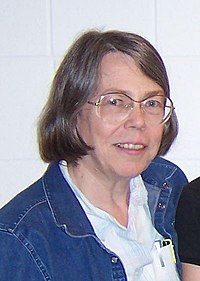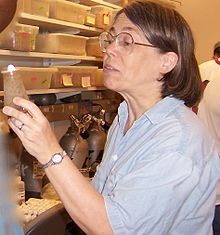Sarah Elgin
Sarah C.R. Elgin | |
|---|---|
 Sarah C.R. Elgin | |
| Nationality | American |
| Alma mater | Pomona College, California Institute of Technology |
| Known for | heterochromatin, science education |
| Awards |
|
| Scientific career | |
| Fields | Biochemistry, Biophysics, Genetics, Epigenetics |
| Institutions | California Institute of Technology; Harvard University; Washington University in St. Louis |
| Doctoral advisor | James Bonner |
| Doctoral students | Lee M. Silver Karmella Haynes |
Sarah C.R. Elgin is an American biochemist and geneticist. She is the Viktor Hamburger Professor of biology at Washington University in St. Louis, and is noted for her work in epigenetics, gene regulation, and heterochromatin, and for her contributions to science education.
Early life and education
Sarah "Sally" Elgin was born in Washington, DC. She grew up in Salem, Oregon.[1] In high school, Elgin studied fallout levels in Oregon rainwater after nuclear weapons tests in the Soviet Union.[2] She received her B.A. in chemistry from Pomona College in 1967.[3][1] While at Pomona, she participated in a summer research program at the University of Leeds characterizing the egg stalk of the green lacewing fly Chrysopa vittata.[4] Elgin did her graduate work in the lab of James Bonner at the California Institute of Technology, isolating and characterizing nonhistone chromosomal proteins from rat livers. She received her Ph.D. in biochemistry in 1972.[1] Elgin stayed at Caltech for her postdoctoral research, working in the lab of Leroy Hood. She continued to isolate and characterize nonhistone chromosomal proteins but started studying Drosophila.
Academic career and research
After her postdoc, Elgin joined the faculty in the Department of Biochemistry and Molecular Biology at Harvard University,[1] where her lab pioneered immunostaining of polytene chromosomes from Drosophila larval salivary glands[5] and nuclease digestion assays.[6][7]
In 1981, Elgin joined the faculty in the Department of Biology at Washington University in St. Louis. Her lab isolated and characterized Heterochromatin Protein 1 in Drosophila[8] (now known as Su(var)205 or HP1a). To probe chromatin environments, her lab developed a P element construct with a copy of the white gene driven by the hsp70 promoter. When this reporter gene is inserted into heterochromatic environments, the fly eyes display a variegating phenotype, whereas when the P element is inserted into euchromatin the fly eyes show a red phenotype; this phenomenon is known as Position-effect variegation. Nuclease digestion assays have confirmed that the eye phenotypes are indicative of the chromatin environment surrounding the P element insertion site.[9][10] In 2006, Elgin was named as the inaugural Viktor Hamburger Distinguished Professor in Arts and Sciences.
At Washington University, in the St. Louis area, and nationally, Elgin has been active in science education. She founded the Washington University Science Outreach program in 1989 and has been active in science education in the University City school district.

In 2002 Elgin became an HHMI Professor with the goal to develop core curriculum to integrate primary research in genomics with a college course called Phage Bioinformatics. In addition, Elgin has collaborated with professors all over the country to improve the sequence annotation of different species of Drosophila fruit flies, especially for the dot chromosome.[11][12] This project is a consortium of 174 member colleges and universities who participate in sequence improvement and annotation projects with the goal of publishing the results in primary research journals and also publishing data on learning experiences for students taking research-intensive classes based on GEP data.[13][14][15]
Genomics Education Partnership
In June 2005, Elgin held a one-day hands-on introductory workshop at Washington University in St. Louis, to show visiting faculty what her students were able to do in genome annotation. The 17 faculty who attended all signed on to a proposal to the Howard Hughes Medical Institute (HHMI) to establish the Genomics Education Partnership (GEP). The HHMI grant was funded, and GEP’s first cohort of members attended a full training workshop in June 2006.[16]
Awards and honors
- National Academy of Sciences, 2018[1]
- Bruce Alberts Award for Excellence in Science Education (American Society for Cell Biology), 2006, shared with A. Malcolm Campbell[17]
- Award for Exemplary Contributions to Education (American Society for Biochemistry and Molecular Biology), 2007[18]
- Elizabeth W. Jones Award for Excellence in Education (Genetics Society of America), 2009[19]
- American Academy of Arts and Sciences, 2012[20][1]
Notes and references
- ^ a b c d e f "Sarah C. Elgin". National Academy of Sciences. Retrieved August 30, 2018.
- ^ "Which mentor had the biggest impact on your career and why?".
- ^ "Starr Named to Academy". Pomona College Magazine. Pomona College. 24 June 2020. Retrieved 29 August 2020.
- ^ Roberts, S.C. (1966). "Brief description of the early stages of Chrysopa vittata (Neuroptera Chrysopidae)". Entomologist's Gazette. 17: 85–89.
- ^ Silver, L M; Elgin, S C (February 1976). "A method for determination of the in situ distribution of chromosomal proteins". Proc Natl Acad Sci U S A. 73 (2): 423–427. Bibcode:1976PNAS...73..423S. doi:10.1073/pnas.73.2.423. PMC 335921. PMID 813226.
- ^ Wu, C; Bingham, PM; Livak, KJ; Holmgren, R; Elgin, SCR (April 1979). "The chromatin structure of specific genes: I. Evidence for higher order domains of defined DNA sequence". Cell. 16 (4): 797–806. doi:10.1016/0092-8674(79)90095-3. PMID 455449. S2CID 10025372.
- ^ Wu, C; Wong, YC; Elgin, SCR (April 1979). "The chromatin structure of specific genes: II. Disruption of chromatin structure during gene activity". Cell. 16 (4): 807–814. doi:10.1016/0092-8674(79)90096-5. PMID 455450. S2CID 25861704.
- ^ James, TC; Elgin, SCR (November 1986). "Identification of a nonhistone chromosomal protein associated with heterochromatin in Drosophila melanogaster and its gene". Mol Cell Biol. 6 (11): 3862–3872. doi:10.1128/MCB.6.11.3862. PMC 367149. PMID 3099166.
- ^ Wallrath, LL; Elgin, SCR (1995-05-15). "Position effect variegation in Drosophila is associated with an altered chromatin structure". Genes & Development. 9 (10): 1263–1277. doi:10.1101/gad.9.10.1263. PMID 7758950.
- ^ Sun, FL; Cuaycong, MH; Elgin, SCR (April 2001). "Long-Range Nucleosome Ordering Is Associated with Gene Silencing in Drosophila melanogaster Pericentric Heterochromatin". Mol Cell Biol. 21 (8): 2867–2879. doi:10.1128/MCB.21.8.2867-2879.2001. PMC 86916. PMID 11283265.
- ^ Slawson, EE; Shaffer, CD; Malone, CD; Leung, W; Kellmann, E; Shevchek, RB; Craig, CA; Bloom, SM; Bogenpohl, J 2nd; Dee, J; Morimoto, ET; Myoung, J; Nett, AS; Ozsolak, F; Tittiger, ME; Zeug, A; Pardue, ML; Buhler, J; Mardis, ER; Elgin, SC (2006-02-20). "Comparison of dot chromosome sequences from D. melanogaster and D. virilis reveals an enrichment of DNA transposon sequences in heterochromatic domains". Genome Biol. 7 (2): R15. doi:10.1186/gb-2006-7-2-r15. PMC 1431729. PMID 16507169.
{{cite journal}}: CS1 maint: numeric names: authors list (link) - ^ Leung, W; Shaffer, CD; Cordonnier, T; Wong, J; Itano, MS; Slawson Tempel, EE; Kellmann, E; Desruisseau, DM; Cain, C; Carrasquillo, R; Chusak, TM; Falkowska, K; Grim, KD; Guan, R; Honeybourne, J; Khan, S; Lo, L; McGaha, R; Plunkett, J; Richner, JM; Richt, R; Sabin, L; Shah, A; Sharma, A; Singhal, S; Song, F; Swope, C; Wilen, CB; Buhler, J; Mardis, ER; Elgin, SC (August 2010). "Evolution of a distinct genomic domain in Drosophila: comparative analysis of the dot chromosome in Drosophila melanogaster and Drosophila virilis". Genetics. 185 (4): 1519–1534. doi:10.1534/genetics.110.116129. PMC 2927774. PMID 20479145.
- ^ Chris Shaffer, Consuelo Alvarez, Cheryl Bailey, Daron Barnard, Satish Bhalla, Chitra Chandrasekaran, Vidya Chandrasekaran, Hui-Min Chung, Doug Dorer, Chunguang Du, Todd Eckdahl, Jeff Poet, Donald Frohlich, Anya Goodman, Yuying Gosser, Charles Hauser, Laura Hoopes, Diana Johnson, Chris Jones, Marian Kaehler, Nighat Kokan, Olga Kopp, Gary Kuleck, Gerry McNeil, Robert Moss, Jennifer Myka, Alexis Nagengast, Robert Morris, Paul Overvoorde, Libby Shoop, Susan Parrish, Kelly Reed, E. Gloria Regisford, Dennis Revie, Anne Rosenwald, Ken Saville, Stephanie Schroeder, Mary Shaw, Christopher Smith, Mary Smith, Eric Spana, Mary Spratt, Joyce Stamm, Jeff Thompson, Matthew Wawersik, Barbara Wilson, Jim Youngblom, Wilson Leung, David Lopatto, Sarah C R Elgin. The Genomics Education Partnership: Successful Integration of Research into Laboratory Classes at a Diverse Group of Undergraduate Institutions, Cell Biology Ed-Life Sci Ed 9:35-40 (Spring, 2010).
- ^ Elgin, Sarah C. R.; Hauser, Charles; Holzen, Teresa M.; Jones, Christopher; Kleinschmit, Adam; Leatherman, Judith; Genomics Education Partnership (December 2016). "The GEP: Crowd-Sourcing Big Data Analysis with Undergraduates". Trends in Genetics. 33 (2): 81–85. doi:10.1016/j.tig.2016.11.004. ISSN 0168-9525. PMID 27939750.
- ^ Lopatto, David; Rosenwald, Anne G.; DiAngelo, Justin R.; Hark, Amy T.; Skerritt, Matthew; Wawersik, Matthew; Allen, Anna K.; Alvarez, Consuelo; Anderson, Sara; Arrigo, Cindy; Arsham, Andrew (2020). "Facilitating Growth through Frustration: Using Genomics Research in a Course-Based Undergraduate Research Experience". Journal of Microbiology & Biology Education. 21 (1): 40. doi:10.1128/jmbe.v21i1.2005. ISSN 1935-7877. PMC 7048401. PMID 32148609.
- ^ Lopatto, D.; Alvarez, C.; Barnard, D.; Chandrasekaran, C.; Chung, H.-M.; Du, C.; Eckdahl, T.; Goodman, A. L.; Hauser, C.; Jones, C. J.; Kopp, O. R. (2008-10-31). "Undergraduate research. Genomics Education Partnership". Science. 322 (5902): 684–685. doi:10.1126/science.1165351. ISSN 1095-9203. PMC 2953277. PMID 18974335.
- ^ "Bruce Alberts Award". American Society for Cell Biology. Retrieved August 30, 2018.
- ^ "Award for Excellence in Education". American Society for Biochemistry and Molecular Biology. Retrieved August 30, 2018.
- ^ "Elizabeth W. Jones Award". Genetics Society of America. Retrieved August 30, 2018.
- ^ "Members by Subject and Year of Election" (PDF). American Academy of Arts and Sciences. Retrieved August 30, 2018.
